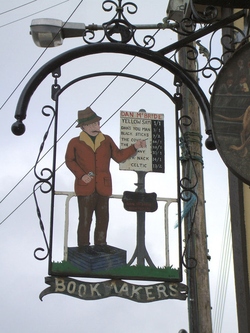
Many of us might aspire to one day own and run our own business. The fact of the matter is, that whilst you’re an employee, you’re always going to be lining someone else’s pocket. The freedom and – if you’re lucky – financial benefits of running your own company are huge, but it comes with great responsibility.
However, ask a would be entrepreneur what kind of business they want to run and very few would say ‘bookmaker’. To most, this probably seems unachievable as a career choice. The vast sums of money that are needed to both pay staff and honour bets is surely impossible to attain for most?
However, if you can make it work, the rewards can be huge. Here are some revenue figures from some of the big brands to highlight just how much money there is to be made:
- Ladbrokes-Coral = £2.5 Billion
- William Hill = £1.7 Billion
- Paddy Power = £1.75 Billion
- Bet365 = £2.3 Billion
- Betfred = £800 Million
These aren’t realistic for a start-up bookie, but they are great goals to aim for. You also only need a really small part of the overall pie to see huge returns. The industry is worth around £15 Billion per year in the UK alone, so there is a lot to go around.
What Type of Bookie Will You Be?
Bookmakers in the UK fall into 3 brackets:
- Track side
- High street
- Online
The demographic and scope for expansion with each of these will vary massively. Given that the industry is shifting massively to online and, in particular, mobile betting, this sector is going to have more potential for net wins, but it will also be much more competitive.
When starting out, you don’t necessarily need to work exclusively in one of these arenas, but it’s going to be easier to get established in one area and then try to expand from that, rather than take all 3 on at once.
Whichever route you choose, there are going to be hoops that you need to jump through and challenges to overcome.
Mindset

One thing that we want to stress before we really get into this article is that you need to switch your mindset from bettor to business owner. You’re not looking to make a quick buck here, you’re looking to carefully set lines and then react as money comes in.
If you start leading with your heart over the margins and numbers, you’re going to go broke, fast. You may as well become a professional gambler instead. You aren’t gambling here.
William Hill don’t gamble, they set lines, and then as money comes in they move odds and prices about to guarantee returns on each event. This isn’t a case of hearing a tip on the 2:20 at Newmarket here, you need to be ready to react to a £10,000 bet on that horse and then make sure your liability is in order should it lose.
Whilst we aren’t really going to delve into how bookmakers work in this article; it’s assumed that you know how a book runs but you are looking to turn that process into a business.
Licensing Overview
 All bookmakers in the UK are going to need to apply for a license from the UK Gambling Commission.
All bookmakers in the UK are going to need to apply for a license from the UK Gambling Commission.
This is not optional if the bookmaker is going to legally ply their trade in the UK, and penalties for going ahead without one are severe.
The license that you need and the process you have to go through to get it will differ depending on the type of bookmaker that you are going to become, but we will cover those later.
It’s also worth noting that if multiple types of bookmaking were going to be taking place (i.e. online and track side) a license for each type would be needed and separate applications submitted and paid for for each.
Track Side Bookmaker
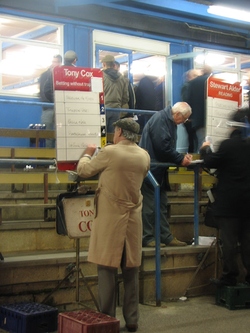
Track side bookmakers are a dying breed in this modern era of betting.
These are the guys who are often referred to as ‘independents’ and you can find them alongside dog racing tracks and horse racing tracks.
Why are they in decline?
Well, a big reason is the fact that the number of tracks themselves are in decline. In the UK over the last 50 years, from a peak of 120 or so in 1950, dog racing tracks have plummeted to just 21 in 2019.
If there are no tracks, then there’s nowhere for track side bookies to trade.
However, opportunities do still exist, you just need to work a little harder to find them.
This route into the industry is also going to be the easiest for many as it requires the least investment in terms of overheads and set up costs.
Licensing

Track side bookies are going to need to apply for a ‘non-remote general betting (limited) operating license’. This will allow you to legally provide the facilities to take bets at tracks as an on-course bookmaker.
This first thing to note with the application is that you are going to need to have public liability insurance, as instructed by the Administration of Gambling on Tracks Ltd (AGT). Additionally, they will also require a valid Horserace Betting Levy Board certificate. These guys will dig deeper into who is running the business and how, to make sure it’s fair and above board.
Licensing for on-track bookmakers is actually pretty cheap considering. You will have an initial application fee that will range from £160 for up to 75 days on track and then £881 for 200+ days on track.
Once an application has been submitted and accepted, annual fees are £200 for up to 75 days, £467 for 76-199 days and then £1,346 for 200+ days. All of these figures are due annually as part of your licensing agreement with the UK Gambling Commission. In an act of uncharacteristic generosity, during the first year of trading a 25% reduction will be applied to annual fees.
Equipment Costs
 There will also be some costs that you maybe didn’t think of. These can be quite expensive, although on the plus side these are all one-time purchases, so it isn’t a cost you have to bear annually.
There will also be some costs that you maybe didn’t think of. These can be quite expensive, although on the plus side these are all one-time purchases, so it isn’t a cost you have to bear annually.
The first thing you will need is a computer. The computer will be used to track bets, markets and even take bets for some bookies, although some are old-school and still use written betting slips.
You’re not going to want to skimp too much here as the computer is going to be your workhorse. The industry and pricing can change quickly, so you need to be on your toes at all times.
Computer and printer = £1,000
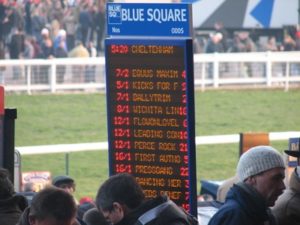
Next up is your joint and display board.
These are where you are going to display the odds for upcoming races.
Again, modern technology has made these digital, but you can still use a simple whiteboard and marker for an antiquated touch, although it definitely won’t look as professional.
Realistically, you need something that stands out and looks good next to the competition.
Joints and display boards can range massively, and you get what you pay for here. Again, you need this to last a good few years, and if you buy cheap you often buy twice… as my old Nan used to say.
Joint and boards = £15,000

Something that people forget about when talking about on-course bookmaking are the picks. The pick is the position that you sit on the course within the betting ring. The higher up you are, the more exposure you get and the more bets you will take.
You need to remember that the majority of the bookies are offering very similar odds here. A punter isn’t going to walk 100 yards down the ring to look at all the prices. They might look at the top 3 or 4 and that’s probably your lot for most.
Think of it like scrolling through Google; how many times do you even scroll past the first 1 or 2 answers, let alone go to page 2? Position of your stall is absolutely vital to get enough exposure.
The cost here can vary. You can get positions that are free, but they are free for a reason as not many people will see your stall. On the other hand, the top picks at the Cheltenham Festival can cost in the region of £250,000.
Lots of the picks are run as auctions. Some have it where you pay a fixed price and then get pulled out of the hat, whereas at others you will bid on the morning of the meeting to get the best spots.
Pick cost = £0 – £250,000
You need the best picks to make the most money.
On Track Margins
 When it comes to on course bookmakers, you need to factor in your margins with each meeting and then work out how much you need to make from there. You need to bear in mind that you have only 6 races for the day and you might be at a meeting with a poor turn out.
When it comes to on course bookmakers, you need to factor in your margins with each meeting and then work out how much you need to make from there. You need to bear in mind that you have only 6 races for the day and you might be at a meeting with a poor turn out.
A 12% margin on turnover is said to be pretty good within the track side bookie trade. Given that average costs for most meetings will hover somewhere around the £300 mark just to get there, get set up, and then maybe cover wages if you have someone helping you (which you will need), this means that you need to take at least £2,500 worth of bets just to break even. And this assumes the bets have gone your way.
If you’re at a quiet race meeting and you’ve a poor pitch, taking £2,500 might be easier said than done.
There’d be little argument with us when we said that whilst track side bookmaking is the easiest to get into, it’s the hardest to do well in. The limited exposure compared with the likes of online bookies means that you need to graft every single day you are track side to make a net win.
There is little to no automation with this form of bookmaking and it’s actually a fine art to perfect.
High Street Bookmaker
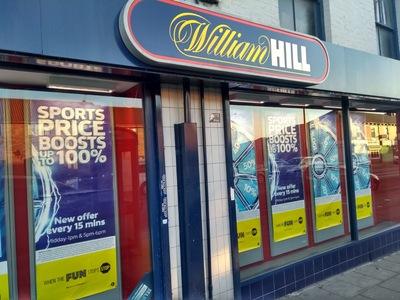 The high street is no longer the thriving industry it once was either. Throughout the UK, pretty much all betting shops have struggled with the increase in online betting and out of town shopping cutting footfall.
The high street is no longer the thriving industry it once was either. Throughout the UK, pretty much all betting shops have struggled with the increase in online betting and out of town shopping cutting footfall.
At the time of writing, the number of high street betting shops has decreased to around 9,000, but the introduction of staking limits on FOBTs (Fixed Odds Betting Terminals) will likely see this number fall again.
On top of this, you have the likes of William Hill, Ladbrokes-Coral, and Betfred owning over 90% of high street bookmakers. These are huge brands to take on if you are a small independent bookmaker, although not impossible by any means.
Licensing

To open a high street betting shop, you will need to apply for a ‘non-remote general betting (standard) operating license’ from the UK Gambling Commission. This allows you provide betting facilities from a betting shop and track side, if you wish.
A high street shop doesn’t just have to just conform with the UKGC, but it will also need to keep the local council happy. You see, you can’t just set up a betting shop wherever you like. Local councils won’t allow bookies near places like schools, highly built up residential areas, or care/nursing homes (anywhere with vulnerable adults nearby) as this can cause huge issues locally.
Each new premises will need to have its own license, so it’s one per shop not one per company. Each license allows up to 4 FOBTs, but if you aren’t going to include these in your shop then licensing fees might be lower.
Application fees are dependent on the annual gross gambling yield for that year. The lowest bracket is under £200,000, and this comes with a £879 application fee. For established businesses, these numbers can jump substantially. For betting companies that are doing over £550million the application fee jumps to £36,029.
Once you’ve been accepted, you will then have to pay an annual fee to the Gambling Commission. Again, these range based on gross gambling yield. The lowest bracket (less than £200k) carries a fee of £1,324 per year and there’s no cap on the maximum. The highest bracket £30million – £125million gross gambling yield or greater per year, and comes in at £778,270 in annual fees. For every additional £250million you can add a further £100,000 onto this figure.
As you can see, the cost of high street bookmaking is prohibitive in fees alone and goes some way to explaining why there aren’t many outside of the ‘Big 4’.
Equipment Costs
 The costings of high street bookmakers are much tougher to really nail down compared to other forms of bookmaking. This is because your location is going to have a massive effect on things like rates, rent, and even tax that you need to pay. So, whilst we’ve done our best to offer you a guide, bear in mind that these numbers can vary.
The costings of high street bookmakers are much tougher to really nail down compared to other forms of bookmaking. This is because your location is going to have a massive effect on things like rates, rent, and even tax that you need to pay. So, whilst we’ve done our best to offer you a guide, bear in mind that these numbers can vary.
Rent is likely going to be the biggest outlay for any high street store. It works in a similar way to the pitch in track side bookmaking, in that the prime locations cost more money.
Given the demise of high streets, it’s tough to define what counts as ‘prime’ these days, but anywhere near a sports ground is a good place to start.
Rent = £15,000/PA
 Next up are your rates and insurance. Again, rates will vary, but you need to take into account electricity, water, gas, phone lines, broadband, TV Sport subscriptions (Sky Sport, BT Sport etc.), catering, and miscellaneous items such as pens, paper, newspaper subscriptions etc. The costs of these will all add up.
Next up are your rates and insurance. Again, rates will vary, but you need to take into account electricity, water, gas, phone lines, broadband, TV Sport subscriptions (Sky Sport, BT Sport etc.), catering, and miscellaneous items such as pens, paper, newspaper subscriptions etc. The costs of these will all add up.
Insurance is a big one as well, given that bookmakers are a prime target for thieves. They are premises that hold more money on site than most others and often with very little security other than regular members of staff.
This means that insurance for high street bookmakers comes at a higher cost than many other businesses.
Rates and Insurance = £10,000/PA
 We’ve spoken briefly about the inclusion of Fixed Odds Betting Terminals in high street bookmakers, and if you do include these you will have to pay rent to use them as well.
We’ve spoken briefly about the inclusion of Fixed Odds Betting Terminals in high street bookmakers, and if you do include these you will have to pay rent to use them as well.
These machines are highly lucrative and one of the main reasons why so many high street bookmakers are still operating today.
This is also why the rent for these machines is so high. The people who rent them out know they are good money earners so they can charge a premium, so long as they don’t price themselves out of the market.
Many companies offer these out at around £2,000 per year, and given that each shop can have up to 4 of them, the costs soon add up.
FOBTs = £8,000/PA
 As you can see, just to open the doors of a high street store you need to be earning at least £33,000, and there are so many smaller additional costs that you could add to this.
As you can see, just to open the doors of a high street store you need to be earning at least £33,000, and there are so many smaller additional costs that you could add to this.
We haven’t even thought about your own wages, and depending on the success of the store you are also going to need to add extra staff who will need paying as well. Full time workers will likely cost £20,000 per year and if you have 2 full time staff that’s £40,000.
This bumps the amount you need to earn each year to £73,000 before you see a penny. That’s not just takings either, because you will obviously have to pay out on some bets which will slow down your progress.
Staff = £20,000-£40,000
The reason why it’s still viable for many bigger companies is that they can function on much smaller margins. For example, if you wanted to take £30,000 as your wage each year, you’d have to bust a gut to get those numbers from one store.
Compare that with William Hill who have 2,300 stores, and they need to make just £13 net win per store to make the same amount.
Online Bookmaker
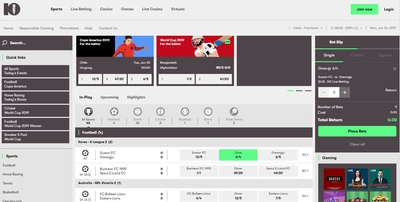 It’s fair to say that the most lucrative betting sector is that of online and mobile. The industry is moving into this space at an alarming rate and it’s worth almost double that of the high street.
It’s fair to say that the most lucrative betting sector is that of online and mobile. The industry is moving into this space at an alarming rate and it’s worth almost double that of the high street.
But the rapid growth and popularity also mean that it’s the most competitive area of the market. There are literally hundreds of online bookies these days so it’s not just the local high street or a handful of track bookmakers that you are coming up against.
However, for those that are tech savvy and understand SEO’s etc, then online bookmaking is going to hold a huge amount of potential. Expansion is so much easier online as you don’t need to create multiple websites in the same way you would need multiple shops, you just need 1 site that you can build on, maintain, and manage.
Both high street and on track bookmakers have a finite number of people they can realistically target. Online has almost no limits, especially given that you can move into other territories outside the UK with the right licensing etc.
Licensing

As ever, you are going to need to gain the proper license to work online. The license that you need will depend on the types of markets that you want to target. As a general license, you should be looking at the ‘remote general betting (standard) (real events)’ licence, and as the name suggests, this covers things like live sports and races that take place around the world.
Other remote licenses include:
- remote general betting (standard) (virtual events)
- remote betting host (real events)
- remote betting host (virtual events)
- remote general betting (limited) – for telephone an email bets only
- remote betting intermediary
- remote betting intermediary (trading rooms only)
- remote pool betting
It may be that you need to apply for more than one license if you are going to cover a lot of bet types.
The rates are about as high as you’re going to find for the remote general betting license. The application fees start from £2,933 for companies that have a gross gambling yield of less than £550,000. This fee goes up to a massive £25,777 for gambling yields of £1billion or more.
As you can imagine, annual fees are as high as they get as well. The start from £3,408 for under £550,000 in gross gambling yield, but rise to £694,856 for £1billion, plus £200,000 for each £500milllon over that amount. Although to be fair, if you were pulling in that sort of money you probably wouldn’t miss it.
Set Up and Costing
![]() Whilst you might think that creating an elaborate betting website would be extremely difficult and labour intensive, what you will find is that a lot of new betting companies actually use what’s called a ‘white label’ provider instead. This is where an outside company provides the website and the functions and features of that site, and then the bookmaker applies their own branding and pays them a fee to use it.
Whilst you might think that creating an elaborate betting website would be extremely difficult and labour intensive, what you will find is that a lot of new betting companies actually use what’s called a ‘white label’ provider instead. This is where an outside company provides the website and the functions and features of that site, and then the bookmaker applies their own branding and pays them a fee to use it.
You might have noticed that a lot of bookmakers look and function similarly. This is because they are using white labels, saving themselves millions in design and set up costs. Realistically, this is the only option for start-up bookmakers on a budget and there are a lot of good white label companies out there.
These companies aren’t just offering the website and the layout; their packages include features such as edit bet, cash out betting, live betting, in-play, net win boosts, different odds formats, backing tools, real time reports, payments, live streaming, and much more.
The cost will be determined by how many features you want to include, but packages are more affordable than you might think – you can get up and running with a basic package for around £20,000. The company will then take a percentage of your net wins from the bets as well, which can range from 30-50% in most cases. Given that all you need to is brand the site, it’s a pretty good deal.
White label website = from £20,000
 For more bespoke designs then you are going to be looking at millions rather than thousands. Bookmakers sites are very complex, they are constantly evolving and adapting and it takes a lot of work to keep up with this.
For more bespoke designs then you are going to be looking at millions rather than thousands. Bookmakers sites are very complex, they are constantly evolving and adapting and it takes a lot of work to keep up with this.
Whilst the costs for the initial design and coding will be huge, you will also need to think about employing people to maintain the site and react when things go wrong. Good coders and designers can cost anywhere from £40,000+ per year.
It’s not just coders either. You need to hire customer services, marketing, finance, brokers, and management. A team of 20 is about the minimum you could get away with, and the cost of hiring them all is vast.
Custom website and staff = £1 million+ up front, £1 million+ in staff/PA
The white label route allows you to function with a very small team. Most of the leg work is carried out by the white label themselves, even customer support, so there is much less work to be done from your end.
However, a bespoke website sets you apart from the crowd and is less restrictive in terms of design, layout, and functionality, which is why some of the bigger companies with many different betting products choose this route.
The Size of Your Float
 Many people wonder how much money you need to cover the bets that you take. Well, this is a really good question and one that’s going to vary for each case.
Many people wonder how much money you need to cover the bets that you take. Well, this is a really good question and one that’s going to vary for each case.
We’ve spoken about margins previously in this article and anywhere around 12% is considered to be pretty good. This means that you want to make a 12% net win from all of the bets that you take. When operating online, these margins can actually be smaller given the volume of bets you could take vs the running costs.
However, you obviously won’t win all the time, even the bookmakers lose bets. The 2019 Grand National was a great example of this with Tiger Roll winning at odds of just 7/2 and bookmakers losing a combined £200million as a result.
The main thing to take away from this is that you need to limit the bet size relative to the amount that you have behind you. So, if you’ve gone into this with a £100,000 float, then you aren’t going to be accepting £50,000 bets at 10/1 which could wipe out your whole business.
There’s no hard and fast rule but working at a percentage of the money you have behind you is a good place to start. If you are online you could say 5% per day, if you are high street or track side, you could increase this slightly to say 10% given the lower footfall.
Being Your Own Bookmaker
Pros
 If you’re looking at becoming a bookmaker, it’s likely that you’ve been involved in the industry previously in some form, even as a punter. There are very few that haven’t enjoyed a flutter at one time or another.
If you’re looking at becoming a bookmaker, it’s likely that you’ve been involved in the industry previously in some form, even as a punter. There are very few that haven’t enjoyed a flutter at one time or another.
Switching your stance from betting to laying allows you to work in an industry you enjoy, but removes a huge element of risk that betting as a punter includes. You need to keep it professional, though, and work as a business, not a gambler.
Being a bookie can earn you a huge amount of money if you do it properly. You could argue that this is no longer true for an on course or high street bookmaker in the modern era, but as we pointed out, you only need a small part of the pie to be making a very tidy living indeed.
Finally, the betting industry isn’t going anywhere soon, and whilst traditional methods maybe aren’t what they once were, there are new markets and sectors that can be tapped into all the time, so as a career choice it’s a pretty stable choice.
Cons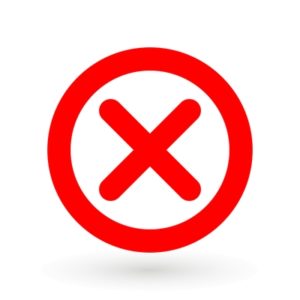
The main downside has to be the costs involved; they can be very high indeed. You’re going to need several tens if not hundreds of thousands behind you just to get the doors open whichever route you choose.
The demise of the high street means that opening a betting shop is not a realistic option in most cases. The online and mobile sectors are thriving, but if you were looking to tap into that market you are competing with four brands in Betfred, William Hill, Coral, and Ladbrokes that own over 90% of stores. Competing in quiet, run-down high streets is going to be really tough!
You’ve also got to bear in mind that you aren’t always going to be able to set the margins that you need or want. The liquidity for on track bookmakers, in particular, is low and a lot of prices are now dictated online rather at the track. The introduction of odds comparison sites for online sites has meant that most bookies are offering pretty much the same prices on most markets these days as well.
The margins are getting smaller, which the bigger companies can afford to absorb, but it squeezes out the smaller independent bookmakers as a result.
